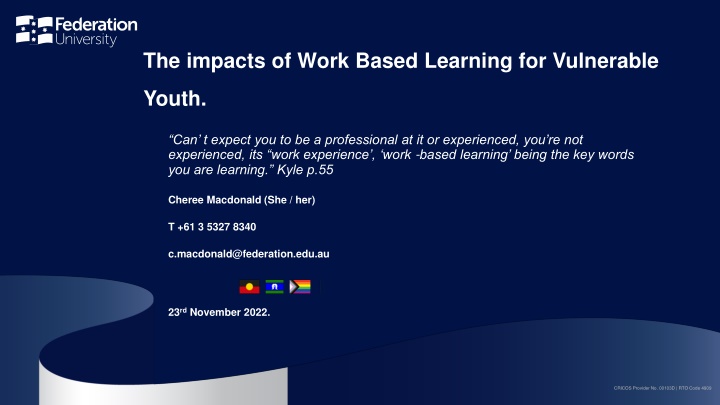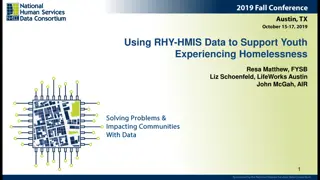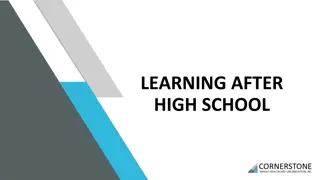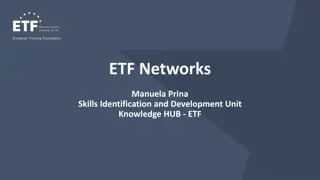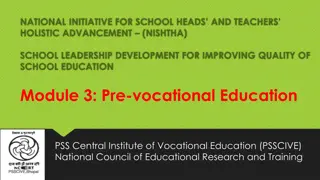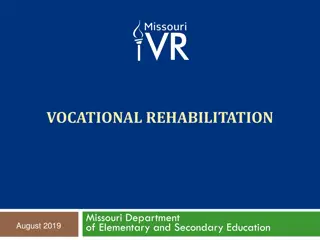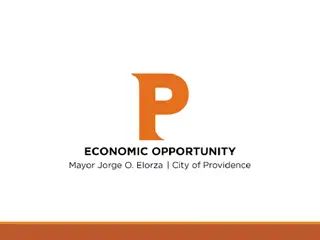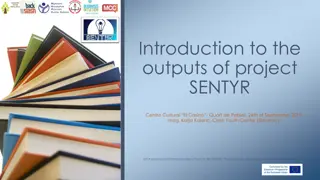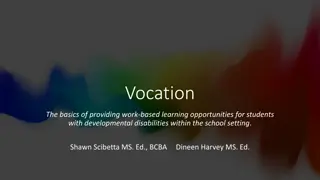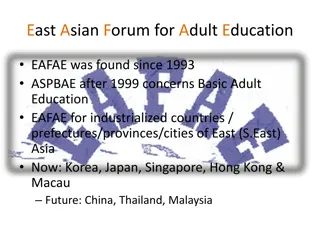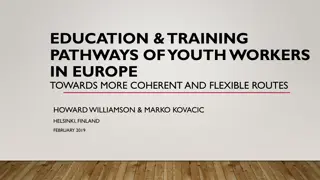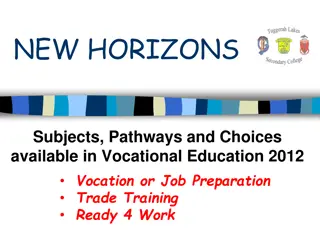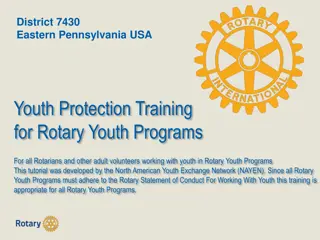Impacts of Work-Based Learning on Vulnerable Youth in Vocational Education
Work-based learning (WBL) is recognized as a catalyst for change in vocational education for vulnerable youth, providing them with a second chance and breaking barriers to access opportunities. WBL, including work experience, virtual experiences, and industry connections, serves as a protective factor for at-risk students, enhancing their engagement, resilience, and aspirations. This study explores how WBL positively impacts education outcomes for vulnerable learners facing various risk factors like low socioeconomic status, disengagement, mental health issues, and learning challenges.
Download Presentation

Please find below an Image/Link to download the presentation.
The content on the website is provided AS IS for your information and personal use only. It may not be sold, licensed, or shared on other websites without obtaining consent from the author.If you encounter any issues during the download, it is possible that the publisher has removed the file from their server.
You are allowed to download the files provided on this website for personal or commercial use, subject to the condition that they are used lawfully. All files are the property of their respective owners.
The content on the website is provided AS IS for your information and personal use only. It may not be sold, licensed, or shared on other websites without obtaining consent from the author.
E N D
Presentation Transcript
The impacts of Work Based Learning for Vulnerable Youth. Can t expect you to be a professional at it or experienced, you re not experienced, its work experience , work -based learning being the key words you are learning. Kyle p.55 Cheree Macdonald (She / her) T +61 3 5327 8340 c.macdonald@federation.edu.au 23rdNovember 2022. CRICOS Provider No. 00103D | RTO Code 4909
Introduction 10 years in Applied Learning Importance of education being relevant to the world of work Industry Led education | Co designed curriculum Multi sector | Curriculum | Student cohorts Vulnerable learners | second chance | CALD CRICOS Provider No. 00103D | RTO Code 4909
Contents Background to the Study Purpose of the Research Key Concepts Methodology Key Themes Outcomes Impact on WBL models Key messages CRICOS Provider No. 00103D | RTO Code 4909
Background to the study Work Based Learning recognised as a catalyst for change how to maximise Vulnerable students second chance Barriers to access opportunities CRICOS Provider No. 00103D | RTO Code 4909
Purpose of the Research How does WBL impact the education of vulnerable youth involved in vocational education? 1. How can work-based learning increase student engagement? 2. What are the positive impacts of WBL? CRICOS Provider No. 00103D | RTO Code 4909
Work Based Learning Work Experience Structured Workplace Learning Virtual Work Experience Industry Connections (site visits, industry panels, co-designed projects) Placements Internships WBL as a protective factor, that is, a characteristic that reduces the negative impact of a risk factor for vulnerable youth, is cited extensively throughout the research literature (Bailey et al. 2005; Billet, 1995, 2004; Bollie & Hof, 2018; Michalopolous et al, 2000). An example of this might be a disengaged learner (at risk of dropping out of school) completing WBL, which impacts their resilience and aspirations for continuing their education (protective factor) (DeLuca et al., 2008). P.27 CRICOS Provider No. 00103D | RTO Code 4909
Vulnerable Learner Risk Factors Low SES Second Chance Education Detached | disengaged from education Mental Health, Drugs & Alcohol Family challenges Learning Challenges Unstable Housing Left mainstream | home schooled Adult Learning Environment VCAL | VET CRICOS Provider No. 00103D | RTO Code 4909
Methodology The epistemological approach centred on a constructivist view. Constructivists argue reality is socially constructed by the persons who experience it. In my research this includes the students undertaking WBL, teachers and workplace supervisors (Darlaston-Jones, 2007) . Qualitative approach student voice Multiple perspective case study semi structure interview 2 Senior Secondary Students VCAL / VET Student Fed TAFE CRICOS Provider No. 00103D | RTO Code 4909
WBL Impact on Vulnerable Youth Increase Student Engagement Positive Impacts Supported challenge -Kyle Workplace provides challenging learning environment - Not all learning is comfortable - Orla Structured reflections on WBL experiences - reviewing and exploring moments of challenge Protective factor Grit perseverance figuring it out - Orla Deepen understanding of workplace and pathway Caring teachers Love push - motivation CRICOS Provider No. 00103D | RTO Code 4909
P-TECH (Pathway in Technology) Recruitment Project IBM Recruitment process Supported challenge Phone interviews - feedback Virtual Work Experience Prototype Website Subject Matter Experts - Industry SCRUM Planning and retrospective meetings Group retrospective Sandwich feedback Reflective discussions and reflective journal Group interviews feedback Job Interview (scaffolded) - feedback Reflective discussions and reflective journal CRICOS Provider No. 00103D | RTO Code 4909
International Students Vulnerable Cultural awareness Barriers Employer misconceptions Opportunities Identifying values and strengths in career coaching deliberate practice share success stories Addressing misconceptions rebranding as a strength Building retrospective reflections into WBL what did you learn about yourself transferable skills Communication styles Work rights Visa Accent CRICOS Provider No. 00103D | RTO Code 4909
Outcomes Student voice provides a different narrative to the at-risk storylines about young people who do not necessarily flourish in a traditional educational setting. Student voice central to decisions about their education and pathway Students viewed WBL as a worthwhile experience, which impacted their social maturity, independence and persistence and preparedness for future work Students who are supported by caring staff, in a WBL program that offers challenge, are capable of developing grit and resilience, particularly when supported by a robust review process. Structured review process to limit the negative impacts CRICOS Provider No. 00103D | RTO Code 4909
Key messages Support students and remove barriers to WBL provides a potential protective factor for vulnerable youth Create opportunities for reflection deepen the impact of WBL Importance of students sharing their views -value student perspective and put it at the centre of decision making in education Embed structured, critical reflection opportunities post WBL CRICOS Provider No. 00103D | RTO Code 4909
Further discussions or questions: Cheree Macdonald she/her 03 5327 8340 c.macdonald@federation.edu.au References Bailey, T. R., Hughes K. R., & Moore, David, T. (2005). Working Knowledge: Work Based Learning and Education Reform. United Kingdom: Taylor and Francis e-Library Billet, S. (1995). Workplace learning: its potential and limitations. Education and Training Journal, 37(5), 20-27. Billet, S. (2004). Workplace participatory practices: Conceptualising workplaces as learning environments.Journal of Workplace Learning, 16(6), 312-324. Bolli, T., & Hof, S. (2018). The impact of work- based education on non- cognitive skills.Journal of Research in Personality, 75, 46 -58. doi.org/10.1016/j.jrp.2018.05.005 DeLuca, C., Hutchinson, N.L., deLugt J.S., Beyer, W., Thorton A., Versnel & Munby,H. (2008). Learning in the workplace: Fostering resilience in disengaged youth. 308-319 doi: 10.3233/WOR-2010-1032 Michalopoulos, C, & Schwartz, C. (2000). What Works Best for Whom: Impacts of 20 Welfare-to-Work Programs by Subgroup. Executive Summary. National Office of Welfare-to-Work, 450(275), 2-20. CRICOS Provider No. 00103D | RTO Code 4909
